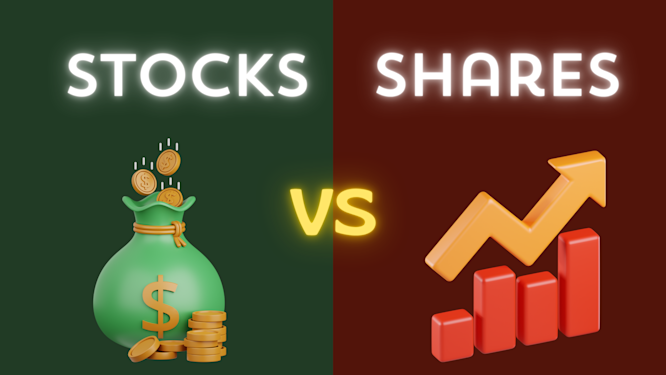Stocks VS Shares : What makes the Difference
Trading Strategies
Before starting to put our money to use, an investor has to have a fundamental comprehension of terms like stocks and shares. Investors are attempting to raise the capital needed to achieve their long- and short-term objectives. Stocks and shares are required. Despite these significant differences, companies and investors extensively utilize these two products to achieve their financial goals. This blog discusses the distinctions between stocks and shares. On the day the stock was issued, a notional value was ascribed to each share. It's not the same as the market value, which is based on supply and demand for shares. In the financial markets, it can occasionally be challenging to distinguish stocks from shares. Having shares indicates your interest in various companies. But the only way for someone to get shares is by buying stock.
What is a Share?
A share is a single unit of ownership in a firm. A company's shares are the remaining units that remain after its whole share capital is divided or split. It serves as the basis for both the ownership portion of an organization's share capital and its ownership stance in the business. In a company, a share is the smallest quantity of equity. With one share being equivalent to one unit of stock, each share of stock thus represents a portion of the company's ownership. Those who contribute money to the company in order to buy shares are referred to as shareholders by individuals or groups.
Preference shares: Also known as preferred stock, preference shares give their owners the option to receive dividend payments before equity shares do. The members who own these preference shares will also be entitled to reimbursement from the company's assets in the event that the business goes insolvent.
Equity Share: A company's long-term source of funding is equity shares. A company's assets may be claimed by investors, who also have the ability to vote and share earnings.
Shareholders may receive dividends and interest on their investment money. Their investment raises the company's valuation, which raises share prices. After then, stockholders might be able to sell these shares for more money than they were originally bought, recovering their investment.
What is the history of the term "shares" in the finance industry?
The term shares are derived from the Old English word scearu, which means "a cutting, shearing, division," or "a part or division." The divisions of ownership in a company or financial instrument have been referred to as "shares" since the late 16th century. The percentage that each shareholder owns in the company or investment is denoted by the term "share.".
What are Stocks?
Financial assets known as stocks symbolize a shareholding in one or more businesses. You become a shareholder of a firm when you buy stock in it. The stock certificate shows how many stocks you own and acts as identification of ownership. A stock denotes the holder's partial ownership in one or more corporations. Stocks are securities that represent ownership in a business. When an investor buys stock in a corporation, they are essentially gaining some ownership of the business instead of lending money to it. In return for their purchase of business stock, investors are entitled to a share of the profits and assets of the company.
Kinds of stocks:
There are mainly two kinds of stocks: common stock and preferred stock.
Common stockholders are entitled to vote at shareholder meetings. They have greater direct control over the company's investments and regularly get dividends. However, preferred stockholders do not have the ability to vote.
Compared to the typical market average, stocks in this category rise and make a profit quicker. They don't usually provide dividends, so investors expect capital appreciation instead. Such shares might be offered by a young IT company.
Making money in stock
Stocks are known to carry more risk than any other type of fixed investment. However, they also have the potential to yield the highest profits. If you currently own equities, there are two ways you can profit: The price at which shares are sold must be higher than the purchase price. Companies often pay dividends, or payments to shareholders; your gain would be the difference in price. While not all stocks pay dividends, those that do frequently do so on a quarterly basis.
How can I purchase stocks or shares?
A brokerage account with a broker-dealer authorized to execute orders on the stock exchange is required in order to buy stocks or shares. You must have enough funds in your account to cover the cost of your transaction as well as any fees or commissions your broker may charge. When you've completed your investigation and selected the stocks or shares to buy, you can use the broker's interface to place your order. Once your order has been fulfilled and confirmed, your shares or stocks will be retained on file. Generally speaking, buyers of stocks want to purchase companies whose values they believe will rise.
Key points
Through stocks and shares, individuals and groups can invest in businesses and receive a portion of the profits.
Furthermore, in order for businesses to raise capital for their operations, both now and in the future, these two financial instruments are necessary.
We should be well-versed in both arguments before making any stock investments.
Once you have a plan for your investments, stocks can be bought separately or as part of a portfolio.
Keep an eye on your short- and long-term stock selections, and always diversify your holdings.
Do share your views and comments on the blog


